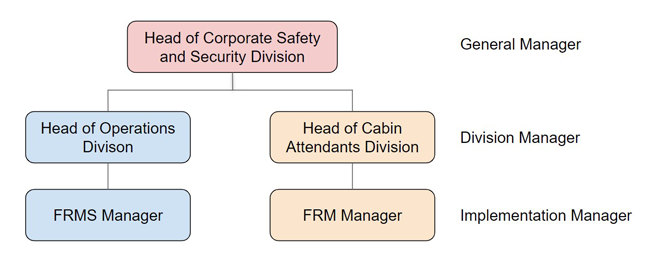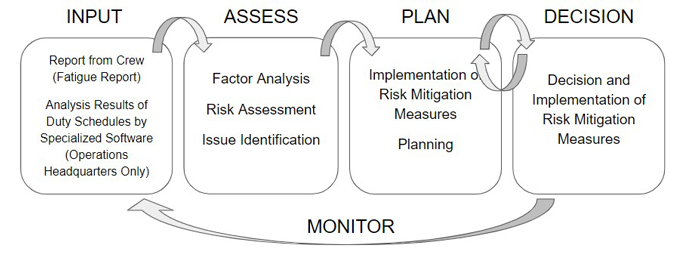Fatigue Risk Management Program
To enhance operational safety and improve quality, we view crew fatigue during duty as a risk. We collect data on the fatigue of flight crew and cabin crew and implement risk management to take appropriate corrective actions based on this data.
Fatigue risk management is implemented globally and is mandated by the Japan Civil Aviation Bureau (for flight crew from October 2017 and for cabin crew from October 2020).
What is Fatigue Risk?
Fatigue risk refers to unsafe events (or risks) that can occur due to a decrease in crew performance caused by brain fatigue resulting from lack of sleep, prolonged wakefulness, disruption of the internal clock due to time differences, and increased workload.
Fatigue Risk Management Policy
It is recognized that fatigue risk of flight crew and cabin crew is an inevitable hazard that exists during an operation, and the company shall endeavor to effectively manage and reduce fatigue risk of flight crew and cabin crew to improve flight safety. JAL's fatigue risk management applies to all operations conducted by the company and is implemented through continuous, data-driven risk management based on scientific insight and performance. Fatigue risk management consists of stakeholders exercising the following responsibilities (Shared Responsibility).
Fatigue Risk Management Structure

Fatigue Risk Management Process

In short, fatigue risk management is about preventing strong drowsiness during duty. This is not easy in a business model that operates 24 hours a day, but we support individual crew members in preparing for duty (ensuring they are fit-for-duty) through knowledge provision and other means, and provide duty schedules that support this.
It is stipulated that crew members must not take on duty if they are not fit-for-duty. However, if a crew member feels strong drowsiness or fatigue during duty due to various circumstances, they submit a report on the background, and the organization receives this report, initiating the fatigue risk management process. We conduct factor analysis and risk assessment results, and review duty schedules as necessary.
Furthermore, as a fundamental premise of fatigue risk management, as stated in the "Fatigue Risk Management Policy," it is important that the company and crew correctly recognize their respective responsibilities and foster mutual trust. To this end, we regularly provide information and education related to fatigue and sleep.
In this way, fatigue risk management is an initiative that supports the safety management implemented by Japan Airlines.

